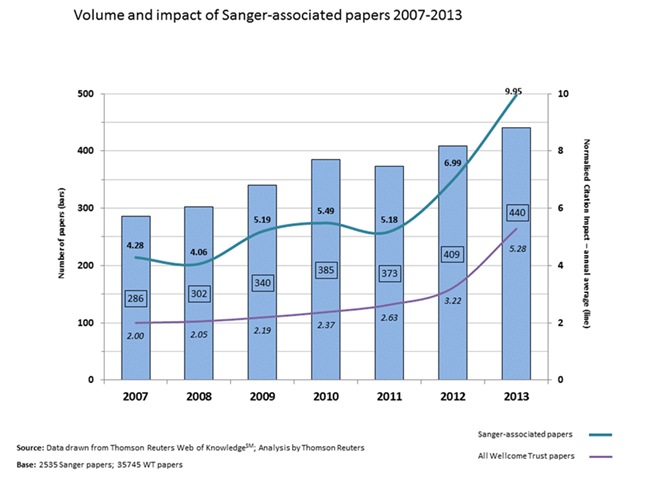Open Access Science
The Sanger Institute is completely committed to sharing its data, as well as the resources, materials and publications it produces. Rapid and open data sharing strategically supports the Institute’s mission by enabling research and accelerating translation. The Sanger Institute never shares identifiable information about any of those who participate in its research and has strict measures in place to ensure that the privacy of research participants is protected. These measures include anonymising human genomic data and managing access to data so that only bone fide researchers from legitimate research organisations may access human data. Researchers wishing to access data may do so through the electronic Data Access Mechanism (eDAM).
Data Sharing
The Data Sharing policy requires that researchers share their data as widely and effectively as possible with the following considerations:
- Access – Data should be deposited in accessible repositories, wherever possible. For human data, these repositories will typically have managed access. Dataset accession numbers must be included in any publications.
- Ethical Considerations – Researchers must always protect the privacy and confidentiality of research participants. Access to human data sets will usually be managed, although this may vary according to the consent given by participants. Conditions for access must be transparent.
- Rights of Data Providers – Researchers should be appropriately credited for their contribution to data generation.
- Optimising Translation – In certain circumstances, it may be appropriate and necessary to delay sharing of data to allow for intellectual property protection in order to ensure that the data is used for benefitting health.
The data sharing policy is based on our commitment to the Fort Lauderdale Agreement.
Publications

The Wellcome Trust and the Sanger Institute are leading advocates for open and unrestricted access to publications. Widespread distribution of the Institute’s research, alongside data and resources, is the best way to maximise the impact and utility of the research undertaken at the Sanger Institute.
The Sanger Institute requires researchers to publish all research either in open access journals or in journals that allow deposition of the article within six months of publication in the Europe PubMed Central (PMC) repository.
Researchers should be aware that other funders, notably Gates Foundation, may have more stringent publication requirements, which they will be required to adhere to as part of their funding agreement.
Data Security
Much of the research at the Sanger Institute requires collection of data from research participants. It is expected that the vast majority of studies will use anonymised data. Identifiable data may only be used in exceptional circumstance with prior Institute approval. Personal Data is data containing identifying information. Collection, use, storage and sharing of personal data is covered by the Data Protection Act (1998). Researchers should be aware that the Data Protection Act also covers recordings and images of patients and research participants where these contain, or are held with, identifying information. Data that is anonymised/pseudonymised better protects research participants’ privacy and is not subject to the same restrictions as Personal Data. Researchers at the Institute are expected to received anonymised/pseudonymised data, recordings and images.
Principles of Data Protection
There are Eight Principles of Data Protection, which state that data must be:
- Processed fairly and lawfully
- Obtained for specified and lawful purposes
- Adequate, relevant and not excessive
- Accurate and up-to-date
- Not kept any longer than necessary
- Processed in accordance with the individual’s rights
- Securely kept
- Not transferred to any other country without adequate protection in situ
Ethical Approval
All research using personal data requires approval from an appropriate Research Ethics Committee. Researchers must also have participants’ consent to collect, use, store and share their personal data.
Data Security
Researchers at the Sanger Institute must be mindful of how they store all human data, regardless of whether it is covered by the Data Protection Act, and should ensure that appropriate security measures, as outlined in the Data Security Policy, are in place to limit access and prevent misuse.
Software
Researchers at the Sanger Institute often develop software during the course of their work. In line with the Institute’s ethos of openness and sharing, researchers are typically expected to make their software available to others if it might be useful to them. All workers at the Sanger Institute who author software as part of their work at the Institute must assign copyright of the software to Genome Research Ltd. (unless an exception applies), but are then allowed to license it freely to others under a free software license.
The Institute also requires that staff who author publications describing software (or methods implemented in software) must distribute the associated software publicly under a free software license by the time the article is published. Unless it supports published work, researchers are not required to distribute their software to anyone, but nonetheless many choose to do so. If you are interested in software available from the Institute, please refer to the list of software and tools.
The full text of the software policy and implementation notes are maintained by the Institute’s Informatics Committee.